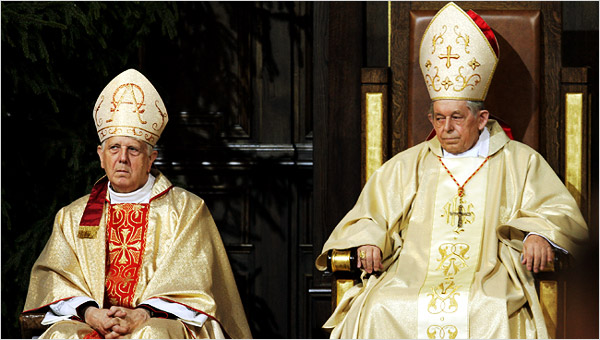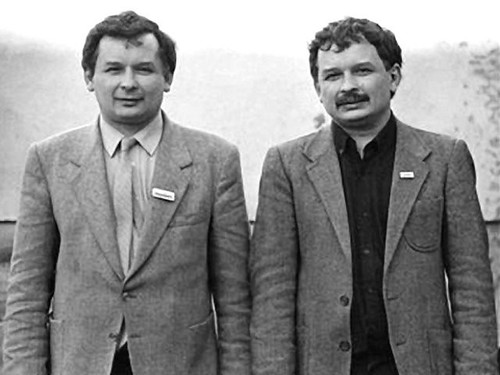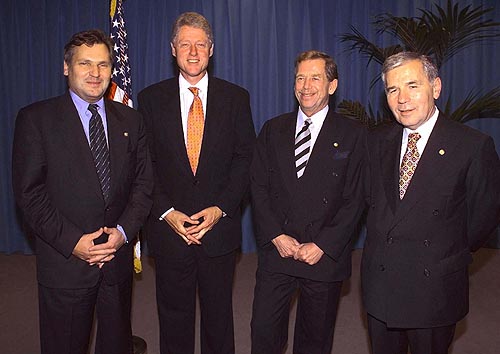Tuesday, January 09, 2007
The Polish Bishop, the Commie Spy and the Washington Connection. posted by Richard Seymour
Stanislaw Wielgus is not a household name in my house either, but it can't help but be funny that he has resigned as archbishop of Warsaw because it has been revealed that he used to work for the Stalinist secret police. It is particularly funny because the Catholic Church in Poland has recently been collaborating with the ruling twins, the Kaczynski Brothers, on a commie-hunt (and gay-hunt too, despite the outing). The commie-hunt is conducted under the guise of investigating past crimes carried out by the Stalinist regime (they even staged a public reconstruction of the 1981 coup in Warsaw last December). The Kaczynskis, it has to be said, are themselves stridently pro-American, utterly fervid about free markets (within the national setting), but anti-EU. However, they themselves are not the most reactionary individuals in their coalition and in the context of Polish politics have actually come from the centre.
It is in their coalition building with the contemporary heirs of what used to be called the Endecja (National Democrats) that they have allowed the most vicious bigoted filth to come to the centre of politics. The Endecja were, as you might have guessed, the most pro-Nazi Polish movement during the 1930s, and their younger, more radical members took great pride in the antisemitic pogroms. Even when the actual fact of Nazi occupation obliged them to take up arms in exile, they concentrated their fire against the Soviet Union, and hence had little support. The League of Polish Families, an ultra-reactionary nationalist party, is led by Roman Giertych, whose father was a proud member of Endecja prior to World War II. They are embedded in the present Polish cabinet. There is also what is characterised as a 'left-populist' group in the government. Andrzej Lepper (it is, sadly, two ps), who made his name with peasants and farmers by staging 'direct action' and 'civil disobedience' against the EU, leads the Self-Defense of the Republic of Poland. Their primary focus appears to be on economic protectionism and social welfare, but they have no problem governing in a rightist coalition, any more than they chafed at supporting the Democratic Left Alliance in key votes when it was in government. Nevertheless, Lepper gained 15% in the 2005 Presidential elections, and is now the deputy PM. He has rolled back most of his radical proposals and has instead distinguished himself by defending one of his supporters in the European Parliament over allegations of raping a prostitute in Brussels, by saying: "How can you rape a prostitute?" Further, Lepper is reputed to have a past on the far right which he now repudiates. The current government of Poland is therefore slightly to the right of Louis Quatorze, and this revelation about the would-be Primate (yes, you evolutionists should have a giggle about that word) is certainly an embarrassment to them.

However, even more embarrassing will have been that the Polish faithful are apparently unhappy about the resignation. Now, why should that be? Well, it's only a guess, but I should think that Polish Catholics are altogether very familiar with the collaboration between the Catholic Church and the Stalinist regime. The heart of Catholicism in Poland until 1981 was Cardinal Wyszynski, who was Primate until his death in that year. He, like many in the Church, faced repression at the hands of the regime, but seems to have made his peace with them by 1957, when he started to gather votes for the communists. The reason was simple - for the wing of Catholicism that he represented, the trouble hadn't started with communism, but with the Reformation, after which everything was equally shit. Therefore, why be less eager to work with communists than anyone else? And besides, Germany was still seen as a significant threat by both the communists and the Catholics (this was true as late as 1991, when the new national security doctrine in Poland was unveiled, two years after Germany had officially recognised the Western borders). The communists agreed with Wyszynski that the Western territories were Polish and not German, and therefore should have Polish bishops and not German ones as the Vatican wished. Further, the regime did not reprove when Wyszynski led a delegation of Polish bishops to address the Pope, assuring him of the undying loyalty of the Catholic Church in Poland, but warning him not to expect them to implement Vatican II. (Incidentally, the only Polish Catholic the Vatican could find who would declare support for Vatican II was one Cardinal Karol Wojtyla). Cardinal Glemp, who will resume the role of Primate now that Wielgus has resigned, was Wyszynski's closest collaborator. He was also one of the most ardent voices urging the Polish workers not to resist the Jaruzelski coup. You get the picture? It would be hard to find someone in a suitably senior position in the Catholic Church in Poland who had not collaborated in some fashion with the late Stalinist regime.
So, what are twins and their revolting allies doing in government anyway? Over a decade ago, the world was looking on with astonishment as Poland gave a mandate to the postcommunist Democratic Left Alliance, led by Kwasniewski. Lech Walesa, the hero of the West, was ousted. It looked as if the catastrophic consequences of shock therapy had galvanised a massive rebuke for the Washington Consensus, and indeed it had. But then the CC of what had been the Polish United Workers' Party had initiated the transition to private capitalist class power, as a means of preserving their rule in the face of an upsurge of working class resistance in 1988. The parties that subsequently emerged, whether neoliberal or social-democratic, were of the nomenklatura. It was in part because of this that the postcommunist SdRP (which subsequently merged with the Democratic Left Alliance) lost the election, in the summer of 1989, to Solidarity. Solidarity had by this time already shifted substantially to the right, following their 1981 defeat at the hands of Stalinism, and had begun to seriously court Washington long before they were elected. They embraced 'shock therapy', a disastrous programme which led to the bankruptcy and closure for huge numbers of public enterprises. Privatisation was often simply a means by which the ruling elite could snatch some public assets. The most genuinely left-wing social-democrat in the first post-communist government was a real hero of the anti-Stalinist movement, the late Jacek Kuron, and yet he ended up imposing some atrocious neoliberal reforms. (To his credit, he later admitted that he had "fucked up" and was almost totally isolated in his harsh criticism of the Kwasniewski government's decision to send troops to Iraq).
When Kwasniewski defeated Lech Walesa in 1995, he proceeded to carry out most of Walesa's policies, particularly on integration into the EU, and into NATO, and on privatisation. The former ruling class simply decided that the best protection and hope for future growth was to be found under the umbrella of the American empire. This was not an uncontroversial process - while Kwasniewski was personally popular most of the time, his crawling support for the Kosovo war was not, and neither was the alarming alacrity with which he privatised pensions along lines proposed by the World Bank, thus making the largest portion of social security dependent on the movements of the stock market. The privatisations produced significant worker unrest as when miners in Silesia and shipyard workers engaged in strikes and protests in 2002 and 2003. With official unemployment rates going as high as 20%, hardly any of the unemployed were entitled to benefits. However, with the promise of foreign direct investment and economic growth, Kwasniewski did persuade most Poles to accept the EU accession treaty. It is worth noting that Solidarity were given another chance in 1997, when Marian Krzaklewski united with a cluster of small right-wing groups to take the Polish parliament. But their absymsal record ensured that in 2001 they were sent packing, and the Democratic Left Alliance won again with 41% of the vote. However, 41% support sank to a pathetic 5% in the polls because of welfare cuts and a series of corruption scandals. Perhaps the most unpopular decision taken was to follow the empire into Iraq. You'll remember this: it was the sort of thing that was happening across many of the Eastern European countries where ruling elites were haggling for privileges with the US. Rumsfeld called it New Europe. Poland's specific angle was apparently the offer of access to American aircraft markets, promises which have not been kept. More generally, however, as Adam Michnik explained: "Poland is an ally of the United States of America. It is our duty to show that we are a reliable, loyal and predictable ally. America needed our help, and we had to give it." As much as anything else, it was the manner of its spear-carrying, the contemptuous attitude toward public opposition, that did them in. Kwasniewski and Leszek Miller explained to a press conference before any parliamentary vote was taken that Poland had already agreed to commit troops. And parliament approved the measure without a whimper of protest.

When it came to the 2005 Presidential elections, therefore, the Democratic Left Alliance and Solidarity stood no chance. The two chief candidates were Lech Kaczyński, who stood as a protectionist, and Donald Tusk, who stood as a neoliberal. Kaczyński took the second round by a margin of roughly ten per cent, but quickly moved to reassure Washington that Polish troops would remain in Iraq. The administration is an extremely loose coalition, held together by Catholic nationalism, and conservatism on social issues. The discrediting of the main parties of the left, and the decline in union organisation following workers' defeats at the hands of neoliberal governments, has left plenty of fertile soil for populist reactionaries. There is some revival, as this article makes clear, and popular opinion on most issues is well to the left of any of the main political parties or figures. It would certainly be idiotic to write off the Polish working class, which produced one of the most astounding mass movements in history. But their temporary defeat and disorientation has left Poland with a spineless, embezzling political class, parties that slither around in base bigotry where they aren't spinning folk tales about the wonders of privatisation, and a capitalist class rapidly on the make and in Washington's pocket. Like the departed Stalinist regime, it finds the Catholic Church useful in securing consent. Like most US client regimes, the sign and sanction of the empire's protection of the new nomenklatura is the presence of military bases, in this case under the rubric of Nato. Like the bases that used to be dotted around Saudi Arabia, these have nothing to do with any external aggressor. The pledge is implicitly to defend the regime from internal threats, provided it does as its told. And it is, and will continue to do so.










